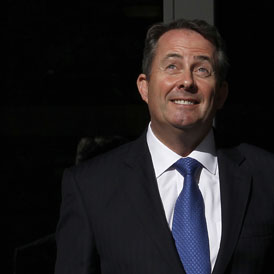PM backs Liam Fox pending full report into Werritty row
As an interim report blasts the blurring of the line between ministers’ public and personal interests, campaigners tell Channel 4 News the government must deliver on promises to regulate lobbying.
During a much-anticipated and well-attended statement in the Commons, Dr Fox reiterated his apology for “errors of judgement” rather than to deliberate wrongdoing.
Meanwhile, Downing Street has issued a statement following the delivery of the Ministry of Defence (Mod) permanent secretary’s interim report into the conduct of Dr Fox regarding Mr Werritty.
It said: “It is clear, as Liam Fox himself said yesterday, that serious mistakes were made in allowing the distinction between professional responsibilities and personal loyalties to be blurred – and this has clearly raised concerns about impropriety and potential conflicts of interest.
I’m not looking for his head, I’m looking for the truth. Jim Murphy MP
“While the permanent secretary’s initial conclusion is that no classified or other defence related official information was discussed with or given to Mr Werrity by the secretary of state or the department, it is clear that much tighter procedures are needed within the department to ensure that the ministerial code is properly adhered to in future.”
Eighteen overseas meetings
A steady drip-feed of allegations has dogged the defence secretary since it was reported Mr Werritty may have been using his links with a minister of state for personal gain.
Dr Fox said he had met Mr Werritty “in the margins” of 18 trips overseas, including holidays, and his friend had visited him at the MoD on 22 occasions, an increase on the 14 initially claimed.
But he maintained that he did not discuss official business with Mr Werritty and that his friend did not have access to confidential information.
Dr Fox told MPs: “Mr Werritty was never present at regular departmental meetings, during private meetings we did not discuss either commercial or defence matters.
“He had no access to classified documents, nor was he briefed on classified matters.”
But, he added: “I accept, with the benefit of hindsight I should have taken great care to ensure a more transparent separation of government, party political and private business and that meetings were properly recorded to protect myself and government from any suggestion of wrongdoing.
“Again, I accept my personal responsibility for this.”

PM backs Fox ‘absolutely’
Earlier, pending completion of a full report, Mr Cameron had given Dr Fox his support.
Speaking at Heathrow Airport, Mr Cameron said: “Liam Fox does an excellent job as secretary of state for defence. He gives that department good leadership; I think we’ve seen that with all that it’s had to deal with in the Libyan campaign.
“Of course there are a whole series of questions that have come out of the media that Liam is answering; he answered them last night, he gave a good account of himself.”
Downing Street said the prime minister has asked the cabinet secretary to work with the permanent secretary to complete that report and address “all the remaining questions that have been raised by this issue”.
Full disclosure
The developments come as pressure builds on Liam Fox to give a full account of his relationship with his friend Adam Werritty. Mr Werritty is claimed to have passed himself off as an adviser to Dr Fox, despite holding no official post either in government or with the Conservative Party.
Earlier, Shadow Defence Secretary Jim Murphy had said: “I’m not looking for his head, I’m looking for the truth. So far, we’ve had partial truth, evasion, avoidance, obfuscation and today all that’s got to stop.”
However during exchanges in the Commons following Dr Fox’s statement, Mr Murphy found himself on the receiving end of allegations about the same company, Cellcrypt, at the centre of the allegations against Dr Fox.
It was claimed that Cellcrypt gave £10,000 to Mr Murphy and his team to visit the US, though Labour denies any wrongdoing saying the donations has been officially declared.
Read Political Editor Gary Gibbon’s blog: Liam Fox and the smell of political death
Register of lobbyists
The story has renewed calls for a statutory register of lobbyists to clarify who is and is not involved in the lobbying of ministers.
The pledge is included in the coalition agreement and had been something which the previous government had promised to implement but did not.
Thus far no such statutory register exists. Although there is a voluntary register this has been criticised for being “riddled with errors, omissions, inconsistencies and redactions”.
The group Alliance for Lobbying Transparency told Channel 4 News: “Last year, Cameron announced that lobbying was “the next big scandal waiting to happen”.
The prime minister promised he’d “force our politics to come clean about who is buying power and influence”, because, he said, he believes “secret corporate lobbying… is why people are so fed up with politics”.
In May last year, we saw a commitment from the coalition to introduce a compulsory register of lobbyists. This would compel lobbyists to reveal who is lobbying whom and about what.
“Yet since then, the government has sat on its hands. Eighteen months on, the £2bn lobbying/influence industry is as opaque as ever and a consultation on the register has been due since last autumn, ” the Alliance said.
“We need to know who is influencing the decisions of our politicians, whether in defence, health, planning or whatever. Without them, this government’s commitment to transparency looks increasingly weak.”